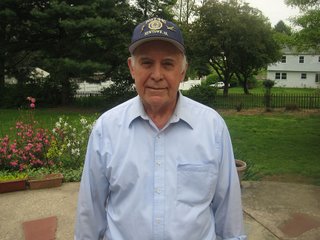The Lalli Brothers
Three Bristol Borough brothers all served in Korea.
By Tim Chicirda, BucksLocalNews.com
Filomeno Lalli, toolmaker and Italian immigrant and wife Anna Ferraro Lalli, a Bristol Borough resident and St. Mark's alum, did not have a son who was a hero. They had three.Ralph, Al and Nick Lalli are all veterans of the Korean War and are all Bristolians.
Ralph
The oldest of the three heroic brothers, Ralph, is the only one who is not a graduate of Bristol High School, graduating from North Catholic High School in Philadelphia in 1950.
Ralph was an Airmen First Class, serving during the Korean War in Fairbanks, Ark. after his basic training in Syracuse, NY. His duties included those of a radio operator in Biloxi, Mich. and he was discharged from Fort Dix.
Ralph met his wife, color guard member Josephine Tosti, a Bristol High grad, while both were in the Bracken Cadets Corps.
Today, Ralph is a retired supervisor from the Nylomatic Corporation in Fallsington, a custom, injection molder that specializes in high quality, close tolerance engineered thermoplastic molding for industrial applications.
Ralph and Josephine have four children, who are all BHS graduates: Raphael, Joanna, Michael and Gregg.
Al
Al, along with twin brother Nick, was born on Dec. 6, 1941, just one day before the Japanese raid on American forces at Pearl Harbor in Hawaii.
Al, an Army Sergeant E5 Special 5, spent over a year in Korea before being stationed in Huachuca, Ariz., after basic training in Fort Gordon, Ga.
Al and field hockey athlete and captain of the color guard Sharon Wilga, also a Bristol High grad, have two sons: Albert and Kevin.
They designed their Wood Street home with the cathedral ceiling and skylights that they've lived in for the last 25 years.
Sharon and Al were also part of the "kids of Bristol" who were "sharp as a pistol," dancing to the Dovell's smash hit, "The Bristol Stomp" at the Goodwill Fire Hall.
Al is now employed at Earl M. Jorgensen Company in Langhorne, a leading supplier of Steel and Aluminum Bar, Tubing, and Plate to manufacturing companies in North America.
Nick
Nick's beginnings in the military are very similar to that of his brother Al.
Born on the same day, Nick, E5 Army Sergeant, and Al both spent time in Korea for 13 months and portions of the United States, as described earlier.
Nick had a bit of a different fate during his military career, as the Taft Street resident is now a disabled veteran, breaking his back during his time in the service. He fell from a 45-foot telephone pole.
Nick retired as chief of maintenance from the Nylomatic Corporation.
He has two daughters: Justine and Angela.
Currently, the three brothers are all members of the Robert W. Bracken American Legion Post 382 and have been for nearly a decade. Nick is Commander, while Al and Ralph are Sergeant-at-Arms.
(Correspondent Cate Murway contributed to this article.)
By Tim Chicirda, BucksLocalNews.com
Filomeno Lalli, toolmaker and Italian immigrant and wife Anna Ferraro Lalli, a Bristol Borough resident and St. Mark's alum, did not have a son who was a hero. They had three.Ralph, Al and Nick Lalli are all veterans of the Korean War and are all Bristolians.
Ralph
The oldest of the three heroic brothers, Ralph, is the only one who is not a graduate of Bristol High School, graduating from North Catholic High School in Philadelphia in 1950.
Ralph was an Airmen First Class, serving during the Korean War in Fairbanks, Ark. after his basic training in Syracuse, NY. His duties included those of a radio operator in Biloxi, Mich. and he was discharged from Fort Dix.
Ralph met his wife, color guard member Josephine Tosti, a Bristol High grad, while both were in the Bracken Cadets Corps.
Today, Ralph is a retired supervisor from the Nylomatic Corporation in Fallsington, a custom, injection molder that specializes in high quality, close tolerance engineered thermoplastic molding for industrial applications.
Ralph and Josephine have four children, who are all BHS graduates: Raphael, Joanna, Michael and Gregg.
Al
Al, along with twin brother Nick, was born on Dec. 6, 1941, just one day before the Japanese raid on American forces at Pearl Harbor in Hawaii.
Al, an Army Sergeant E5 Special 5, spent over a year in Korea before being stationed in Huachuca, Ariz., after basic training in Fort Gordon, Ga.
Al and field hockey athlete and captain of the color guard Sharon Wilga, also a Bristol High grad, have two sons: Albert and Kevin.
They designed their Wood Street home with the cathedral ceiling and skylights that they've lived in for the last 25 years.
Sharon and Al were also part of the "kids of Bristol" who were "sharp as a pistol," dancing to the Dovell's smash hit, "The Bristol Stomp" at the Goodwill Fire Hall.
Al is now employed at Earl M. Jorgensen Company in Langhorne, a leading supplier of Steel and Aluminum Bar, Tubing, and Plate to manufacturing companies in North America.
Nick
Nick's beginnings in the military are very similar to that of his brother Al.
Born on the same day, Nick, E5 Army Sergeant, and Al both spent time in Korea for 13 months and portions of the United States, as described earlier.
Nick had a bit of a different fate during his military career, as the Taft Street resident is now a disabled veteran, breaking his back during his time in the service. He fell from a 45-foot telephone pole.
Nick retired as chief of maintenance from the Nylomatic Corporation.
He has two daughters: Justine and Angela.
Currently, the three brothers are all members of the Robert W. Bracken American Legion Post 382 and have been for nearly a decade. Nick is Commander, while Al and Ralph are Sergeant-at-Arms.
(Correspondent Cate Murway contributed to this article.)
 RSS Feeds
RSS Feeds




